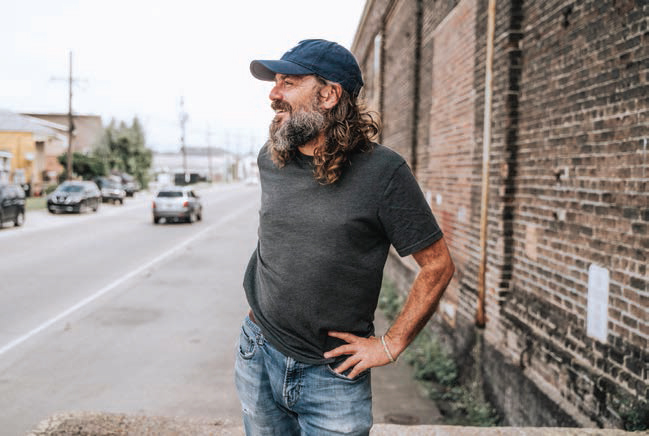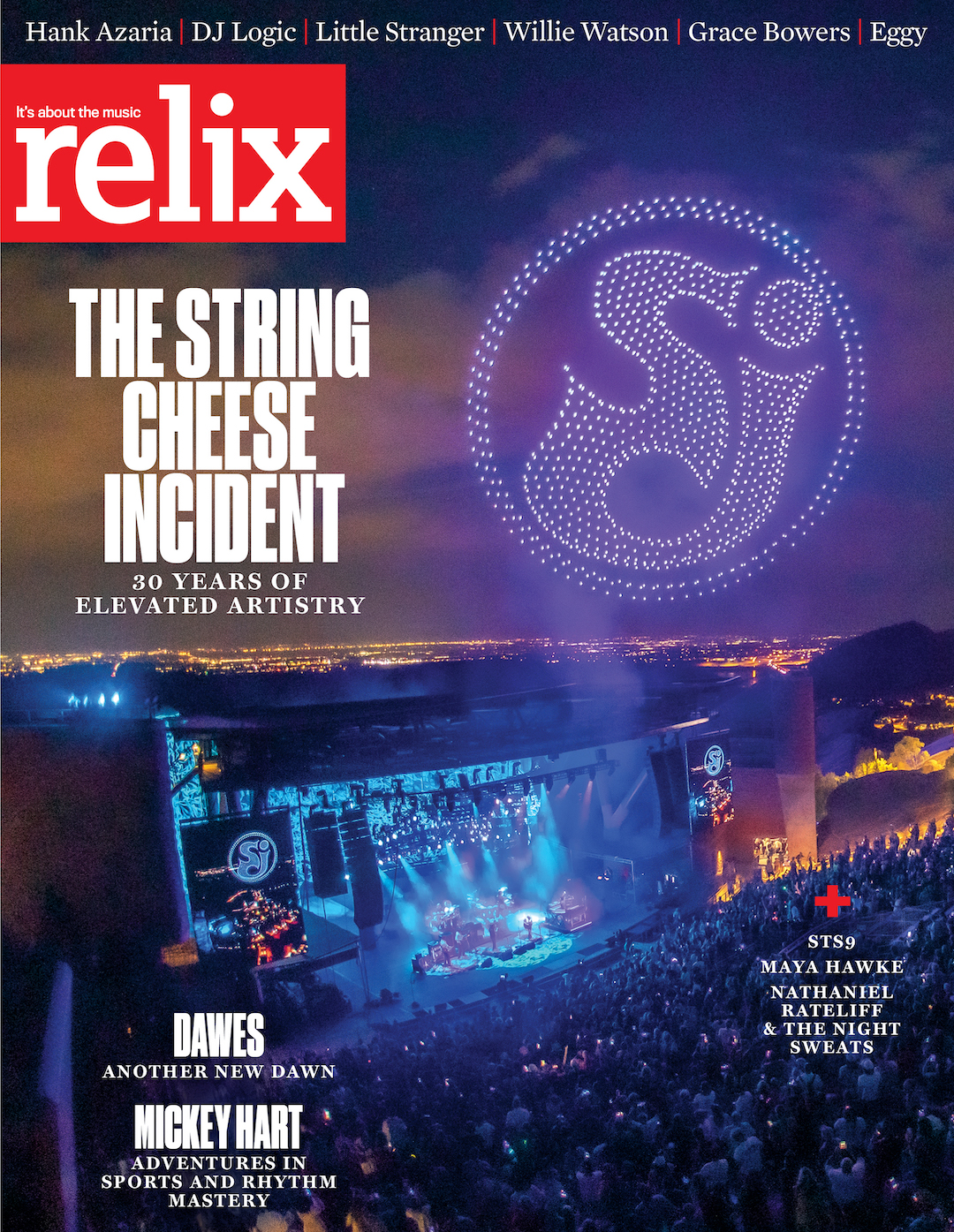The Core: Lo Faber

The God Street Wine singer/guitarist steps out on his own with a new roots-oriented alias, Doctor Lo.
Paging Doctor Lo
I became Doctor Lo first to my students at Loyola University in New Orleans. That was my nickname to them. I could never get them to call me Doctor Faber. Eventually, I just went along with it. So, when I did Bottomland—my first album as Doctor Lo—I decided to go with that for my “artist name” to separate it from the name Lo Faber, which I had used for Henry’s House in 2001 and Friday Night Freakshow in 2003. Those albums were both very ambitious, prog-rock, double-CD rock operas. They had a certain vibe, and the new stuff I am working on now is more Americana/folk/country/ rootsy/bluegrassy. By the time Bottomland came out in November 2019, I had decided to go back to music full time after being a college professor for seven years. My thinking was, “I’m getting older—if I don’t take the leap now, it will be too late.” And maybe it is too late already to have a second career. That’s a real question.
Then, about six months after I made that decision, COVID came. But I didn’t let that deter me; I just moved straight into making a lot of videos at home. I recorded another Doctor Lo album, Claiborne Avenue, and I livestreamed twice a week—just to continue being productive. I played all of [God Street Wine’s] $1.99 Romances and did some special streams with [God Street Wine guitarist] Aaron Maxwell—I wanted to give the people what they wanted, and the tips were great. When Biden was declared the winner of the election, I jumped online and played “Dancin’ in the Streets” without really announcing it first. So, in that way, I had a very nice plague at home in New Orleans with my family. [Laughs.] Eventually, though, my daughter got bored being with us, so I drove her to New York and got her set up in an apartment.
Balancing Acts
Before the pandemic, I had all these dates booked with my new trio with [Ominous Seapods bassist] Tom Pirozzi and [mandolinist/guitarist] Josh Himmelsbach. We played one show in February 2020 before everything was canceled. But, recently, we’ve started to play again. I’ve been staying with my dad at his place in Northeastern Pennsylvania—he has this huge house that was built in the 1920s on 300 acres of land— and we have been using it as a homebase between shows on the weekends. It feels great to be getting back out there and the crowds have been energized, though it looks like things might be turning again. We’ve also added [Ominous Seapods drummer] Ted Marotta to the band; our canceled shows were at coffee houses, and now we just want to rock.
When I was a professor, I focused on being a professor; I didn’t really get to work on my own music nearly as much as I would have liked. I also didn’t play live all that much, except for a little bit with God Street Wine. We did our first reunion show in 2010 [after coming together in 2009 to celebrate the life of longtime friend and former employee Paul Ducharme]. And, from that point on, every summer we played a few shows. But I had a hankering to do more. A lot of my professor-ing was also working with students on their music, so I was leading student ensembles and putting together student concerts, which was pretty rewarding in its own right. But all of those experiences just made me yearn to get back to doing my own music.
I did do some writing for God Street Wine during that time, though. In 2017, we released 7 singles that were all original songs. For whatever reason, we decided not to make them into an album—we just dropped them one at a time. And, in 2019, we also made a new album that was comprised of old material from our early days that was reinvented and rearranged. So I basically made two full God Street Wine albums in three years and then, from there, I went right into the Doctor Lo stuff. It was becoming hard to balance and to do justice to everything.
Coming Home
Bluegrass and folk music are, honestly, closer to my real roots than the Zappa-Steely Dan-prog stuff I was doing with God Street Wine and on my Lo Faber albums. When I was a kid, I played with my mom in bluegrass bands so, for me, getting back to playing that stuff is like coming home. I like all styles of music; I love playing funky stuff, I love playing prog rock. It’s all just music—genres are really mostly about marketing or giving listeners some clues as to what they might be hearing. But when I decided to split it off, I did have a very explicit conversation with my friend Jon Liebowitz, also known as Jon Bevo, who plays keyboards in God Street Wine. He’s one of my best friends in this world. I had a whole bunch of songs around 2018-19, and we had a conversation where I made a conscious decision to take the more country-inflected stuff and channel that music toward my solo project, and take the more funky stuff and channel that toward God Street Wine. It just made me realize I had enough material for two projects, and I needed to make them coherent, each in their own way. It’s not like I enjoy one style better than the other.
I made the tracks for Claiborne Avenue at home, sent them out to some friends and said, “Do your thing.” Dave Eggar also did some great string arrangements, Aaron added some things [along with Bevo and former GSW multi-instrumentalist Jason Crosby] and we released it in June. The album was definitely a product of the pandemic and a lot of the craziness that we experienced—the insanity of Trump. There were all these divisions throughout the country over race and everything that happened with George Floyd, Jacob Blake and all these other instances. Somehow everything became more intensified because of the pandemic. I know I am not unique in that regard; most of the music coming out now has an element of that. Some of the songs are more political— “Kenosha Baby” is about politics in this personal way. And some of the other songs on the album were just purely personal.
I wrote my Ph.D. thesis on the city of New Orleans. It is a city founded on African slavery and sugar extraction trades that has risen above that. It is a culture of survival. That’s a lot to pack into a 4-minute song—my thesis is a 500-page book. But, I still tried to talk about that on “Claiborne Avenue,” and I also just layered in the lonely feeling of being in New Orleans during the pandemic. Bascially, I thought a lot about what makes a good song, versus a book; I did a lot of hinting and suggesting and left a lot of room for the listener.
Great Realizations
In my first music career with God Street Wine, I was pretty egotistical. We looked at our friends Blues Traveler and the Spin Doctors. Things got pretty big for them pretty quickly, and we thought, “We can do that too.” And then, we played for a few years and, all of a sudden, we had this following—things came pretty easy for us. It was easy to say, “This is awesome.” But, since then, I’ve had a lot of great realizations about this world. And one thing that I’ve realized is that, not only was I just one member of a band, but our success was also really about the community that formed around us—the fan base. There is something about those people that made it what it was. And that was a humbling realization, especially as I am trying to do this again.
There was a period when I was down on jamming in a contrarian way. The scene had become very jam-oriented, and I reacted against that. I am a songwriter, and I favored songwriting, probably because I am a better at songwriting than I am at improvisation. But I’ve started to snap back into the jamming side of things. I’ve been listening to some really great Joe Russo recordings, and I’ve realized that jamming can actually be really inspirational. When he was a kid, he was a fan of ours and used to come see God Street Wine at Wetlands, and now he has become this monster on the drums.
What I can say about [God Street Wine doing more shows] is that I would really love to make it happen, but I am only one member of the group. I know Aaron would like to as well, but I can’t say the same thing about the rest of the band. Aaron and I do love playing together and our harmonies and duel-guitar work are a big part of God Street Wine, so that might mean that we have to do another project that involves other musicians. Aaron and I are so different, it is hilarious. He is the greatest, most instinctive musician I have ever met; I am super conscious and intellectual about everything and Aaron is all feel. I wish I could turn off my mind like him when I play.



















